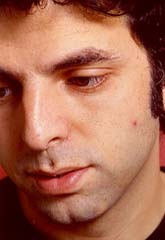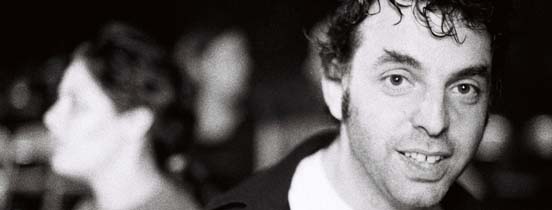A Moment with Etgar Keret

Depending on your point of view, Tel Aviv-based writer Etgar Keret is a charming prankster or a spoiled brat. To his legions of avid fans, Keret's wry, frank, and often surreal vignettes reflect a distinctly contemporary sensibility. To his detractors, Keret's seeming refusal to confront political questions directly in his work reflects the lack of idealism of a new generation of pampered consumerists who seem to care for little more than a good time at the beach. One thing is for sure: Keret has made a definitive mark on the Israeli literary landscape with his distinctive voice, at once mischievous and tender, silly and wise, world-weary and yet somehow full of hope. The best-selling Israeli writer, professor, and filmmaker has authored four story collections including The Nimrod Flipout
Etgar Keret: I love Kurt Vonnegut's books, especially Mother Night. There is something about his perspective that always disorients you as a reader, and I love that in writers. I also love Carver and Cheever for, as Hemingway put it, showing just the tip of an iceberg and leaving so much for the writer to fill up rationally and emotionally. I also love Nabokov -- does he count as an American?
AH: What are some of the major differences between being a writer in Israel and America?
EK: I think writing is usually about the friction between the writing individual and the reality he lives in. I don't think that there is less of that friction in the US than there is in Israel but it is certainly different. The political reality is much more dominant and central in the Israeli everyday life and the privilege to write about something else is one that is not taken for granted. The traditional role of a writer in Israeli society is that of some ancient prophet who can show his people the right path, and if you are a writer who is ambiguous and confused about the crazy reality you live in, it won't be as easy to write about that as I imagine it would be in the US.
AH: Could you talk a little about some of the criticism you've received from older, established Israeli writers (for example, A. B. Yehoshua) for not writing overtly about politics in your work? Actually, this critique surprised me a little once I'd read the book because several of the stories (The Nimrod Flip-Out, For Only 9.99, Surprise Egg) deal with very political themes, such as terrorism or the stress of serving in the army.
EK: I feel my work is very political. It many times talks about racism, fear, hatred or all the other emotions that create the relationship between an individual and the society he lives in. The problem is that in the Israeli tradition political writing must be pragmatic. A story that shows that the current situation is crazy and must stop won't be considered a political story in the classic Israel definition, if the story doesn't take sides clearly and tell the right from the wrong. I find this point of view simplistic and refuse to simplify my emotional experience and add a bottom line to it, just so that writers like Yehoshua will consider me a "responsible writer." A writer in my eyes is not necessarily an educator or someone who knows better than his readers. He can be (and in my case is) just as confused as they are.
 AH: You in turn have criticized left-wing writers who use Palestinian characters in fiction as stand-ins for the entire people. (I actually blushed when you mentioned the "mute Palestinian characters" as I myself have one in my own novel about Israel!) What mistakes do you think they make in their more political work?
AH: You in turn have criticized left-wing writers who use Palestinian characters in fiction as stand-ins for the entire people. (I actually blushed when you mentioned the "mute Palestinian characters" as I myself have one in my own novel about Israel!) What mistakes do you think they make in their more political work?
EK: I must say that choosing a mute to represent another, someone you don't know, is almost a natural choice. If you can't create a voice to a character because you feel his speech and thoughts are far from your own, then making him a mute can be an honest choice. My problem is that sometimes there can be a patronizing subtext to the representation of Palestinians in Israeli novels, making the simplified characters who don't carry the complexity of human character serve solely as victims.
AH: Israel is often a favorite setting for a lot of non-Israeli writers, usually as the setting for political thrillers, rarely with the kind of brash humor or casual tone in your stories. How do you feel about the way Israel is portrayed by non-Israeli writers?
EK: I think that Israel is seen by many writers as a metaphor for subjects that are relevant to their part of the world. I feel that many times the talk about Israel can easily be a way to talk about other subjects in the western world – other world relationships, cultural and economical gaps, socialism versus capitalism, etc. This causes many of the writers to write about something that pretends to be Israel but isn't Israel at all, just a strong symbol that helps them connect to some abstract subject matter.
 AH: Have you ever gotten any surprising responses to any of your stories?
AH: Have you ever gotten any surprising responses to any of your stories?
EK: I often have readers read my stories in a different way than I've written them. Many times readers and reviewers can take an innocent story and turn it into a left wing or right wing manifesto. The story "Shooting Tuvia" [about a family who can't get rid of a particularly misbehaved dog] was interpreted by readers as the story of the Israeli conflict. The dog represented to them the Arab, and the father the Israeli establishment. The boy, according to this strange interpretation, is the Israeli younger generation. I found this interpretation really simplistic and untrue. My story "Rabin is Dead," in which two kids name a kitten Rabin after our late prime minister, caused an audience member in a bookstore reading I gave to physically threaten me.
For more information visit: http://www.tobypress.com/books/keret.htm

